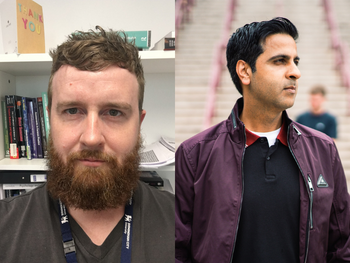University News Last updated 01 March 2023

Media narratives that portrayed British Muslims as resistant towards following public health guidelines during the Covid-19 pandemic have been challenged by new research from leading academics at Birmingham City University (BCU).
The study, led by Dr Damian Breen and Professor Imran Awan, explores the impact of the pandemic and lockdowns on British Muslim communities across Birmingham.
The research also found that British Muslim communities were disproportionately impacted by the pandemic and lockdowns - and suggests ways that policymakers can build a more inclusive and equitable approach to public health guidance.
Dr Breen and Professor Awan surveyed, interviewed and held focus groups with over 130 participants, including community members and leaders, Mosque leaders, Imams, Chaplains, Muslim community organisations and non-faith community organisations with significant stakeholders from British Muslim communities across Birmingham.
Amongst the findings, research participants were disappointed in the disparities in restrictions for the observance of religious celebrations like Ramadan and Eid.
51% of participants reported experiencing stress or anxiety, with this appearing to impact most for those aged 25-34, with 68% reporting stress or anxiety directly resulting from the pandemic.
The 18-month-long project ran from February 2021 to December 2022, as British Muslims in Birmingham began to adjust to the new post-lockdown reality facing their communities.
Findings also show how communities tackled the anxieties felt by Muslim families concerning death bereavement and funeral provision, including attendance and funeral preparation customs within their faith.
“We are able to show how an Islamic Burial Organisation and a working group of Mosque leaders provided training programmes for new generations of community members to learn how to properly facilitate requirements around funeral preparations for Muslims during Covid-19 restrictions,” added Professor Awan.
The study provided insights into how local public health measures that were developed in consultation with British Muslim community leaders in the city led to greater trust between its public health authorities and local communities.
The Economic and Social Research Council (ESRC) funded the project through the UK Research and Innovation (UKRI) Agile Response to COVID-19 scheme, which explores the vulnerability of minority ethnic groups to COVID-19 and the emerging social, economic and cultural impacts of the pandemic on these groups.
All research conducted by the BCU School of Social Sciences and its associated research centres aim to make an original contribution to knowledge and create real-world impact across the themes of sociology, psychology and criminology.